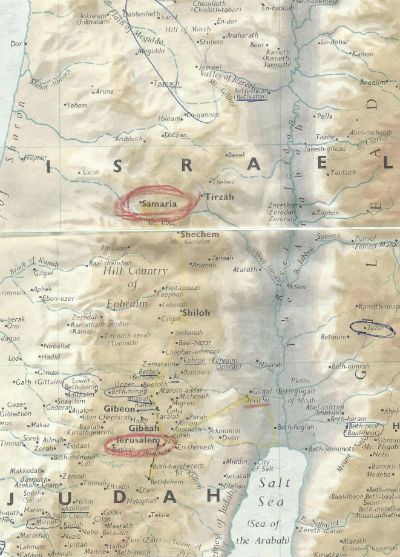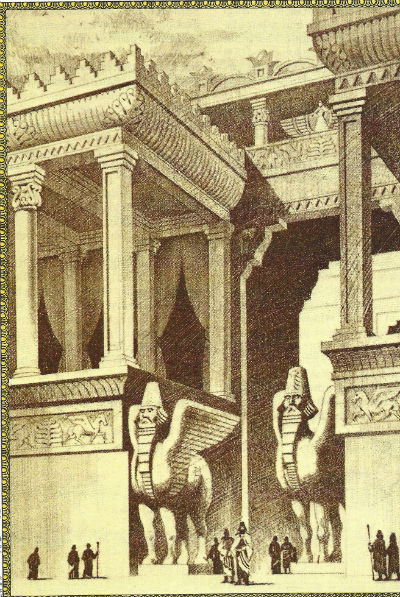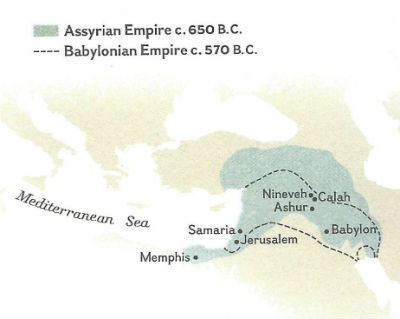Nothing Minor About the Minor Prophets: Grace Amid Judgment
By Neil Earle
 Israel and Judah separated after the death of Solomon but prophets were sent to both. Click to enlarge.
Israel and Judah separated after the death of Solomon but prophets were sent to both. Click to enlarge.
So there they are. Nestled between the big guys – Isaiah, Jeremiah, Ezekiel, Daniel (in our English bibles) – and the New Testament. The Minor Prophets. Jewish scholars call them “the Twelve” and this article makes the claim that there’s nothing minor about the Minor Prophets.
As one who’s been teaching them or alluding to them for 45 years I can vouch for that.
Three things to note however before setting out. Since human nature doesn’t seem to change that much over the centuries, some of these observations will not be “doctored” to seem relevant. If, as the Bible asserts, humankind’s problems are as much spiritual as emotional, political and technological then we might expect there to be lessons for us as we go along.
Also, the prophets did not choose their roles, as most self-appointed prophets and teachers do today. They were “God-troubled men.” By their own confession they were called to their task by the fiery and ever-watchful Lord God of Israel.
Drafted by Yahweh
The Old Testament scholar Gerhard von Rad explained that this element of conscription is evidenced by the fact that the call to ministry shook their bodies as well as their souls. Ezekiel was struck dumb for seven days, Daniel fell in a faint, Jonah almost drowned, Amos was driven into exile, Hosea was told to marry a prostitute. All that happening while they scanned the international horizon to see where God’s people were headed.
Thirdly, Christians believe that Jesus Christ is the grand center of all Biblical prophecy (Luke 24:44) so we can expect to meet him (though in symbolic, veiled form) as we go along since Old Testament writers typically saw the future through their own perspective (notice Amos the farmer’s beautiful outdoor descriptiveness of a peaceful future – Amos 9:13-15).

PART ONE: NATIONS MUST CHOSE – GRACE OR JUDGMENT?
A man named Hosea opens the Twelve. His message was to the affluent society of King Jeroboam II in Northern Israel, a nation which had seceded from Judah centuries before (see map). In Jeroboam’s day (793-753 BCE) Israel was allowed a respite from the Assyrian invasions that would eventually spell the end of the northern kingdom. Israel, cut off from the temple in Jerusalem to the south, chose a religion of heedless self-indulgence and the disgusting worship of the Baals which mixed sexual perversity with religion (Hosea 7:4-7).
To impress the lesson of moral collapse, Yahweh had Hosea marry a prostitute. This was guaranteed to produce trouble. Hosea’s broken family became a living parable demonstrating the nation of Israel’s harlotry before God.
In spite of luxurious living and economic prosperity, Hosea cried out that Israel was being destroyed for lack of knowledge, the knowledge of the true God and his ways (4:6). So just as Hosea pleaded to his wife to stop her errant ways, God pleaded with Israel to turn to his way of peace and blessing and covenant faithfulness. Hosea’s faithless marriage partner was the graphic message to heedless pleasure-obsessed Israel (Hosea 2:19-20). Hosea was essentially a love story but love tested under the worst trying conditions (Hosea 3:1-5).
Joel’s message was to the Southern Kingdom of Judah. The background was a horrendous drought brought on by a locust infestation. Judah too had turned form God's ways of civility, decency and treating each other mercifully. Joel used the locusts as a symbol of invading foreign armies that will surround Jerusalem. But like most of the prophets, Joel offers the people a way out. That way is through repentance and prayer and fasting (Joel 2:12-13). Afterwards God will endow those who respond with the Holy Spirit, a blessed participation in the divine nature that leads to peace of mind and individual and national blessings (Joel 2:28-29).
Nahum Vs. Nineveh
Nahum predicted Nineveh would fall quickly (Nahum 3:12), that a flood would be involved (2:6) and the city would be burned (3:13). The Mallowan expedition of the British School of Archaeology in Iraq from 1949 to 1953 confirmed these accounts. Mallowan recorded, “Never have I seen so perfect an example of a vengeful bonfire, the soot still permeating the air as we approached (Nimrud and Its Remains, Volume II, page 434).The disappearance of Nineveh was so compete that outside modern-day Mosul in what is today called Nineveh Province the Iraqis built a village atop one of the mounds. Excavators bored through 30-45 feet of debris before Assyrian strata come into view. Thus fulfilled the words of the prophet Zephaniah who wrote that “he will make Nineveh a desolation, a dry waste like the desert, herds shall lie down in her midst, all kinds of beasts, even the owls and the hedgehog shall lodge in her capitals…for her cedar work will be laid bare” (Zephaniah 13-14). As historian Paul Dionne of the University of Toronto once declared: “The prophets were extraordinarily well-informed.”
They certainly were.
We have no record whether anyone responded to Joel’s earnest appeal but his work was not in vain. His offer of the Holy Spirit becomes central to the message preached by Jesus and the early church (Acts 2:17-21). Almost every time there is an evangelistic campaign his words are cited. Joel’s words live on. As Hosea had already said, God wounds but he also heals (Hosea 6:1-3). That healing message lives today in the ministry of Jesus and his followers.
Amos fits von Rad's definition of a true prophet, one of those whose calling and task description came from outside themselves. Amos lived in Southern Judah but was sent to warn Northern Israel. This makes him unpopular from the get-go. The corrupt religious leaders confront him. Amos replies: “I was no prophet, nor a prophet’s son, but I was a herdsman and a dresser of sycamore figs. But the Lord…said to me, ‘Go, prophesy to my people Israel. Now therefore hear the word of the Lord” (Amos 7:14-15).
Amos has bitter words for the elite leaders and “fat cats” of Israel who sell the poor for a pair of shoes and take legal advantage (Amos 2:6-8). He shows his prophet’s heart in a stirring dialogue with Yahweh himself. God threatens to wipe out Israel, first by locusts and then by fire but Amos interceded for the people. Hosea, Joel and now Amos–they show forth the love of God, the offer of grace amid the threat of judgment. Extermination is rescinded; the punishment is not the horrible total catastrophe that there could be (Amos 7:1-9). A remnant of Israel will survive to carry out God’s far-reaching purposes.
God Hates Cruelty!
The next two prophets, obscure Obadiah and well-known Jonah, show that God is watching all the nations, hopeful for repentance in the midst of their gross violations of the basic moral law all people have written deep inside (Romans 2:14). Obadiah, verse 10, shows that God hates cruelty, the kind of back-stabbing treachery the nation of Edom to the south apparently inflicted on Judah in a time of dire peril (verses 10-11). Edom and Judah were brother nations and neighbors and yet couldn’t get along. As Frederick Bush summarized it, “Edom epitomized national pride, self-sufficiency, trust in human wisdom and insight” (Old Testament Survey, page 373).
Are these problems we see about us today? For sure. Edomites were renowned for wisdom but God demands holiness – then and now. As a God of justice he ultimately balances the scales. As the nations have done so it will be done to them (James 2:13).
 Artists rendering of the ruins of Ninenveh found outside modern Mosul in the 1840s – these finds virtually began the modern phase of archaeology.
Artists rendering of the ruins of Ninenveh found outside modern Mosul in the 1840s – these finds virtually began the modern phase of archaeology.Jonah is sent to Nineveh, the capital of Israel’s nemesis, proud Assyria. The judgment of God was about to fall on this far-flung but particularly cruel empire (Jonah 3:8).
But Jonah’s short book takes a decidedly hopeful twist. It reminds us again that Israel’s God is the God of all peoples and how kind and compassionate he is. Even though the Assyrians perhaps represented the epitome of cruelty and terror, their king led them to repent at Jonah’s preaching. That is the point of Jonah’s visit. God’s love for all peoples shines forth as he challenges his recalcitrant prophet with the question: “Should I not pity Nineveh?”(4:11).
(NOTE: God does and did and he has kept that commitment in that the Assyrians were one of the first nations to respond to the Gospel. Their descendants are faithful Christians today amid much duress as the Assyrian Church of the East. Truly, these Minor Prophets have a long reach.)
Hope Amid Judgment
The prophet Micah continues in that same theme – the hope of mercy for Northern Israel in the midst of judgment. Even as he exposes heartless land grabbers (2:1-5), the crime spree and assassinations that are despoiling national life (7:2), the total breakdown of family relations leading to abominable human sacrifice (6:7) he holds out hope. “Who is a God like you, pardoning iniquity and passing over transgressions…He does not retain his anger forever, because he delights in steadfast love…You will cast all our sins into the depths of the sea” (Micah 7:18-20).
Now that is the best news any people – any individual – can ever hear!
Micah shows that the God of the covenant has not forgotten his people in spite of their abandonment of the promise to be faithful to him and treat each other mercifully. The survivors in Judah and Israel need these words of hope because as Hosea, Amos and Micah had detailed, foreign invaders will indeed move in to uproot the whole nation of Israel. This happened in 721-718 BCE at the hands of the resurgent Assyrian Empire. But God is consistent. Like Jonah before him, the prophet Nahum has words for Nineveh, the capital of Assyria. “Woe to the bloody city, “Nahum writes of Assyria, a city grown rich through looting their neighbors, “All full of lies and plunder, no end to their prey.” Writers have been astonished at how completely Nahum’s account of Nineveh’s destruction came to pass (see box).
God Rules!
The prophet Habakkuk also had words for foreign powers, in this case the fierce Babylonian south of Nineveh who destroyed Jerusalem in 586 BCE just as Assyria destroyed Israel. Habakkuk is famous for the lesson he learned in the midst of these bewildering shifts in international events. “How could God allow the pagan Babylonians to destroy Solomon’s temple?” he had wondered (1:12-17). It was a dilemma for his belief in a morally just God. Habakkuk penned his reply: “the righteous shall live by his faith” (Habakkuk 2:4).
In the ebb and flow of world history, of international intrigue and threats, it is important for God’s people to retain one overriding focus. God rules in the kingdoms of men! That is true in all periods of history. Even though God’s people Judah were sent into captivity in Babylon God had a purpose. While in Babylon they compiled and virtually completed the Hebrew canon, the books we treasure as the Old Testament. They also came under the grace and favor of Babylon’s conqueror, the mighty Persian Empire. The Persians allowed the exiled Jews to return (Ezra 1:2-4).
And all this drama, these seemingly pointless comings and goings, sets the stage for the work of the last three Minor Prophets.
 Sequence of Empires: Assyria uprooted Northern Israel to be in turn overthrown by Babylon. Under the Persians Jewish captives retruned to Palestine. Click to enlarge.
Sequence of Empires: Assyria uprooted Northern Israel to be in turn overthrown by Babylon. Under the Persians Jewish captives retruned to Palestine. Click to enlarge.PART TWO: THE STIRRING CLIMAX
Around 535 BCE a descendant of legendary King David named Zerubbabel led about 50,000 Jews back to Jerusalem (Ezra 2:2). They were given permission by the Persians to rebuild their sacred temple but the land was desolate, there were wild animals prowling and bitter enemies had laid claim to the land. Haggai, Zechariah and Malachi were raised up to help the people focus on the Big Picture. It was this: God will be with his people in the midst of their troubles but they must build the temple to give them a form of national unity and as a sign of their loyalty to him. When a rudimentary building was constructed the old generation who had remembered Solomon’s mighty edifice was bitterly disappointed (Ezra 3:12). Therefore Haggai was inspired to predict that “the latter glory of this house shall be greater than the former” (Haggai 2:9).
How so?
Another prophet, Malachi answered. He said: “the Lord, whom you seek, will suddenly come to his temple and the messenger of the covenant whom you delight in” (Malachi 3:1). Christians believe that this was fulfilled in the appearance of Jesus Christ who taught often in the temple Zerubbabel’s generation had begun. Jesus as the Messenger of the Covenant also initiated another covenant, the New Covenant or New Testament as we call it today. This covenant would extend into a relationship with all people groups (Hebrews 8:13; Matthew 21:13).
The Minor Prophets thus take us on a spectacular journey across time and space, from the heady days of King Jeroboam II to a chastened people preparing to receive their Deliverer/ Messiah at last. The move us from power politics to the certain hope of a new kingdom to arrive with healing in its wings (Malachi 4:2, already initiated at Jesus’ first coming. The prophet Zechariah summarized these developments in Chapter One, verses fifteen to sixteen. This introduces his thrilling series of eight visions and four oracles centered mainly on the future glory of Jerusalem and the new temple that would be visited by the Lord himself. “Thus says the Lord, I have returned to Zion and will dwell in the midst of Jerusalem, and Jerusalem shall be called the faithful city, and the mountain of the Lord of hosts…Let your hands be strong, you who in these days have been hearing these words from the mouth of the prophets who were present on the day that the foundation of the house of the Lord of hosts was laid, that the temple might be built” (Zechariah 8:1-10).
The returned exiles needed these words because it was tough slogging being pioneers in an abandoned land. But Haggai, Zechariah and Malachi sum up the work of The Twelve and those prophets who had gone before. “As I purposed to bring disaster to you when your fathers provoked me to wrath…so again have I purposed in these days to bring good to Jerusalem and to the house of Judah; fear not” (Zechariah 8:14-16).
“Fear not!” would go on to become the most quoted command in the entire Bible!
Jesus in Old Testament Guise
Zechariah is quoted 71 times in the New Testament and he makes numerous if slightly enigmatic references to Jesus – his entry to Jerusalem on a donkey (Zech 9:9), his betrayal for 30 pieces of silver (11:12-13), his abandonment by his disciples (13:7). Zechariah climaxes his book with a highly dramatic and pictorial description of Yahweh bringing his kingdom to earth after one final climactic battle against human evil. As William B. Nelson writes, only in Jesus’ earthly ministry were all these elements welded together, even though some events wait his second coming. Christians today cherish the memory of Jesus standing in the temple and offering the living water of the Holy Spirit that Zechariah wrote about so colorfully (Zech.14:8; John 7:37).
There it is. The Minor Prophets. Nothing minor about them as they take us in overview from the corrupt and dying kingdoms of Old Israel to the New Jerusalem. We learn that prophecy is fulfilled in ways that we cannot always see. God's people today, said Habakkuk, must see world events and personal traumas through the eyes of faith. In ways we can never quite realize or understand, one day all their words will be fulfilled and justice and brotherly love will prevail. Then God’s Plan of Redemption for the whole earth will proceed apace. God speed that day.